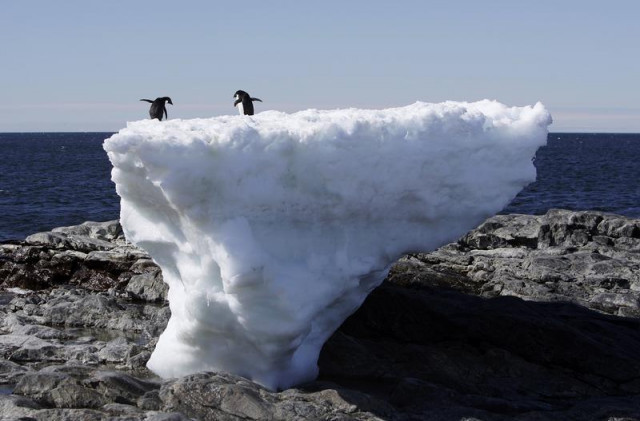Pakistan urges joint efforts for overcoming climate change effects
Adviser to PM says eight countries of HKH can’t limit global warming to 1.5C

Representational Image. (PHOTO: REUTERS)
“Pakistan’s land mass has the most incline in the world, from the tip of the K2 to the sea. We are very concerned about our high mountains and are willing to collaborate to see what we can do together,” said Adviser to the PM on Climate Change Malik Amin Aslam during a side event at the Cryosphere Pavilion at COP25 in Madrid on the key findings of the Hindu Kush Himalayan (HKH) report. Ministers from Bhutan and Nepal were also present on the occasion.
Aslam said: “The findings of the report are scary, especially the fact that our mountains are warming at a higher rate. Pakistan has over 7,000 glaciers and 5,000 of them are melting. What happens in our high mountains affects the rest of the country.”
However, he added that the eight countries of the HKH region can’t limit global warming to 1.5 C. “How much affect can ecosystem enhancement have? We can try to protect our ecosystems and adapt to climate change but we can’t stop the melting of our glaciers. That’s why we come to these conferences – the world is losing time. And we have a limited voice at these negotiations”.
He added that the mountain countries should come together and talk about such high mountains at the COPs. “Alone we cannot stop what is happening”.
Agreeing with Aslam, Bhutan Agriculture and Forests Minister Lyonpo Yeshay said: “We need to collectively push the mountain issue, especially at the next COP”. He said that what happened in their mountains affected downstream countries like India and Bangladesh so working together at the global level was important.
“Together we can have a stronger voice… the discussion of what is happening in these high mountains is left out” he said. Bhutan is one of the most ecologically conscious countries in the world with a mandatory law that it must have a 60 per cent forest cover for all time to come.
On the occasion, the experts of International Centre for Integrated Mountain Development (ICIMOD) on the HKH region urged the HKH region countries to cooperate and enhance ecosystem resilience for preventing the effects of climate change.
The ICMIOD experts said that enough information was now available to take action. The information and data that was missing was now included in the assessment report that took eight years to process.
The comprehensive first assessment report launched in February by the International Centre for Integrated Mountain Development (ICIMOD) on the HKH region has filled in the scientific gaps of knowledge about such high mountains, according to Dr Philippus Wester of ICIMOD.
Dr Wester said: “These [HKH] high mountains are the pulse of the world and what happens to them affects two billion people or one fourth of humanity. The HKH will warm more compared to the global mean and will warm even more rapidly at higher elevations.”
He added that even if global temperature rise is kept within 1.5 C, such high mountains will lose one third volume of their glaciers by 2100. “Agricultural yields along the Indus River that are dependent on melt-water (as much at 80-90 per cent from glaciers and snow) will be affected,” he added.
According to Aisha Khan, the head of the Civil Society Coalition for Climate Change who is also at COP25, “acknowledging political differences, we have to create new space for social, ecological and environmental issues taking a regional approach”.



1724319076-0/Untitled-design-(5)1724319076-0-208x130.webp)















COMMENTS
Comments are moderated and generally will be posted if they are on-topic and not abusive.
For more information, please see our Comments FAQ